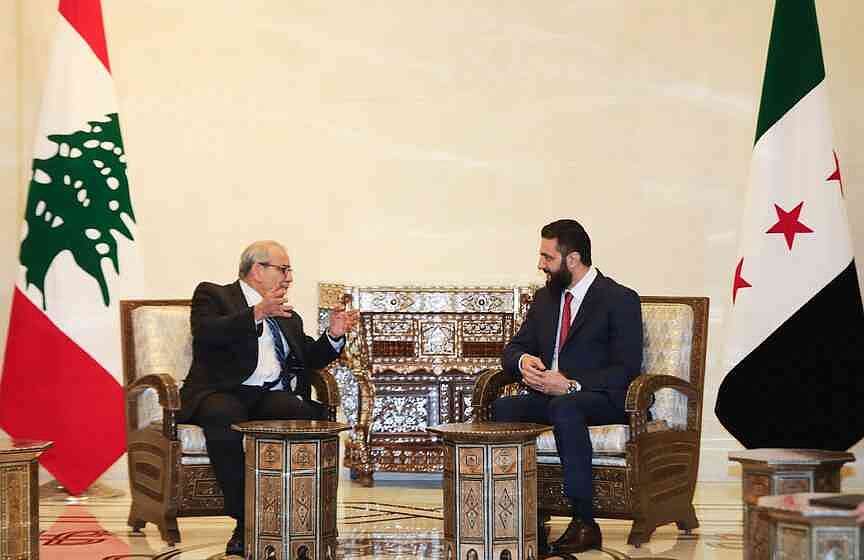BEIRUT — Lebanese Prime Minister Nawaf Salam led a high-level ministerial delegation to Syria on Monday for talks with Syrian President Ahmad al-Sharaa, marking the most significant diplomatic visit between the two countries since the fall of Bashar Assad’s government in December.
“My visit to Damascus today aims to open a new page in the history of relations between the two countries, based on mutual respect, restoring trust, good neighborliness,” Salam said in a statement on X.
At the center of discussions was implementing a March 28 agreement signed in Saudi Arabia by the Syrian and Lebanese defense ministers to demarcate land and sea borders and improve coordination on border security issues, Salam said in the statement.
The Lebanese-Syrian border witnessed deadly clashes earlier this year and years of unrest in the frontier regions, which have been plagued by weapons and illicit drug smuggling through illegal crossings.
During Monday’s meeting, Salam and Sharaa agreed to form a joint ministerial committee to oversee the implementation of the border agreement, close illegal crossings and suppress smuggling activity along the border.
The border area has long been a corridor for illicit trade, arms trafficking, and the movement of fighters — including Hezbollah militants who backed the Assad government during Syria’s 14-year civil war.
Lebanon also pressed Syria to provide clarity on the fate of thousands of Lebanese nationals who were forcibly disappeared or imprisoned in Syrian jails in the 1980s and 1990s, during Syria’s nearly 30-year military presence in Lebanon. Human rights groups have long documented the lack of accountability and transparency regarding these cases.
Syrian officials for their part raised the issue of Syrian nationals detained in Lebanese prisons, Salam said. Many of the detainees were arrested for illegal entry or suspected involvement in militant activity. Rights advocates in both countries have criticized the lack of due process in many of these cases and the poor conditions inside detention facilities.
Lebanon pledged to hand over people implicated in crimes committed by the Assad government and security forces, many of whom are believed to have fled to Lebanon after the government’s collapse, if found on Lebanese soil, a ministerial source told The Associated Press.
The official spoke on the condition of anonymity because they are not authorized to publicly comment.
In return, Lebanese officials requested the extradition of Syrians wanted in Lebanese courts for high-profile political assassinations, “most notably those involved in the bombing of the Al-Taqwa and Al-Salam mosques, those convicted of assassinating President Bashir Gemayel, and other crimes for which the Assad regime is accused,” Salam said. The 2013 twin bombings of the Al-Taqwa and Al-Salam mosques in Tripoli in northern Lebanon killed more than 40 people.
Salam said he also pushed for renewed cooperation on the return of Syrian refugees.
Lebanese government officials estimate the country hosts about 1.5 million Syrian refugees. While Lebanese authorities have long urged the international community to support large-scale repatriation efforts, human rights organizations have cautioned against forced returns, citing ongoing security concerns and a lack of guarantees in Syria.
Also on Monday, Russia’s state Tass news agency reported that Syrian Ambassador to Moscow Bashar Jaafari has requested asylum in Russia. The report, which wasn’t confirmed by the authorities, followed Russian media claims that the interim government had asked Jaafari, a longtime ally of Assad, to return to Damascus.
Jaafari later denied asking for asylum in an interview with RIA Novosti, another Russian state news agency.
 In this photo released by the Lebanese Government press office, Lebanese Prime Minister Nawaf Salam, left, shakes hands with Syrian interim President Ahmad al-Sharaa in Damascus, Syria, Monday, April 14, 2025. (Lebanese Government press office via AP)
In this photo released by the Lebanese Government press office, Lebanese Prime Minister Nawaf Salam, left, shakes hands with Syrian interim President Ahmad al-Sharaa in Damascus, Syria, Monday, April 14, 2025. (Lebanese Government press office via AP)